CRI实用英语课堂 Unit 18 Happy Thanksgiving 温馨感恩节
搜索关注在线英语听力室公众号:tingroom,领取免费英语资料大礼包。
(单词翻译)
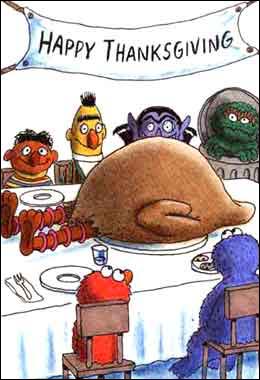 Part 1 The History of Thanksgiving in the USA 感恩节的来历
Part 1 The History of Thanksgiving in the USA 感恩节的来历
The Thanksgiving holiday celebrated1 each November in the United States is known worldwide as an American custom. And Thanksgiving and gratitude2 have marked important milestones3 in American life for hundreds of years.
The first Americans observed rituals and ceremonies to express gratitude to a higher power for life itself. A Seneca Indian ritual, for example, states, "Our Creator ... Shall continue to dwell above the sky, and this is where those on the earth will end their thanksgiving." Another quotation4 attributed to American Indians before Columbus is, "The plant has its nourishment5 from the earth and its limbs go up this way, in praise of its Maker6 ... like the limbs of a tree."
The Pilgrims' First Harvest Feast
The Pilgrims who sailed to this country aboard the Mayflower were originally members of the English Separatist Church (a Puritan sect). They had earlier fled their home in England and sailed to Holland (The Netherlands) to escape religious persecution7. There, they enjoyed more religious tolerance8, but they eventually became disenchanted with the Dutch way of life, thinking it ungodly. Seeking a better life, the Separatists negotiated with a London stock company to finance a pilgrimage to America. Most of those making the trip aboard the Mayflower were non-Separatists, but were hired to protect the company's interests. Only about one-third of the original colonists9 were Separatists.
The Pilgrims set ground at Plymouth Rock on December 11, 1620. Their first winter was devastating10. At the beginning of the following fall, they had lost 46 of the original 102 who sailed on the Mayflower. But the harvest of 1621 was a bountiful one. And the remaining colonists decided11 to celebrate with a feast -- including 91 Indians who had helped the Pilgrims survive their first year. The Pilgrims did have a feast in 1621 near Plymouth, Massachusetts, after their first harvest. This is the feast people often refer to as "The First Thanksgiving." This feast was never repeated, so it can't be called the start of a tradition, nor did the colonists or Pilgrims call it a Thanksgiving Feast. In fact, to these devoutly12 religious people, a day of thanksgiving was a day of prayer and fasting.
Nevertheless, the 1621 feast has become a model for the Thanksgiving celebration in the United States. More than likely, this first harvest feast was eaten outside, based on the fact that the colonists didn't have a building large enough to accommodate all the people who came. Native Americans definitely were among the invited guests, and it's possible, even probable, that turkey, roasted but not stuffed, and pumpkin13 in some form found their way to the table. The feast went on for three days, included 90 "Indians," as Native Americans were called then, and had plentiful14 food. In addition to the venison provided by the Native Americans, there was enough wild fowl15 to supply the village for a week. The fowl included ducks, geese, turkeys and even swans.
New World With Many Cultural Influences
In addition to thanksgiving traditions brought to North America by settlers from many parts of the world, some authorities link the American thanksgiving with the ancient Jewish observance of Sukkot in the fall, which expresses thanks to God for the bounty16 of the earth.
Indeed, all the major world religions—including Hinduism, Buddhism17, Judaism, Christianity and Islam—have rituals, observances and liturgies18 that express thanks and gratitude to a higher power for the gift of life and i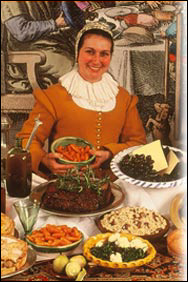 ts wonders. Regardless of the origin of the American Thanksgiving holiday, the following brief timeline shows its development.
ts wonders. Regardless of the origin of the American Thanksgiving holiday, the following brief timeline shows its development.
Timeline of American Thanksgiving Holiday
In 1541, during Coronado's expedition a Eucharistic thanksgiving, with the friendly Teya Indians present, occurred in Palo Duro Canyon19 in West Texas.
Pilgrims and Native Americans enjoyed a harvest feast in Plymouth, Massachusetts in 1621. This feast may have become the model for today's American celebration.
Settlers and colonists from many continents brought customs of days of prayer and thanksgiving, especially in New England, where the first Thanksgiving of the Massachusetts Bay Colony was observed on July 8, 1630.
The first Thanksgiving of the new United States of America occurred in 1777 when General George Washington and his army, as instructed by the Continental20 Congress, stopped in bitter weather in the open fields on their way to Valley Forge to mark the occasion.
Washington's first proclamation after his inauguration21 as the nation's first president in 1789 declared November 26, 1789, as a national day of "thanksgiving and prayer." And the annual presidential thanksgiving proclamations ceased for 45 years in the early 1800s.
President Abraham Lincoln resumed the tradition in 1863.
On November 26, 1941 President Roosevelt signed the bill establishing the fourth Thursday in November as Thanksgiving Day. Because two years out of every seven have five Thursdays in November, some states for the next 15 years celebrated on their own on the last Thursday. Since 1956, the fourth Thursday in November has been observed by every state.
In 1976, the 200th birthday year of America, the Chapel22 of Thanksgiving was consecrated23. President Ford24 referred to it as "a major national shrine," and later President George Bush noted25 that it is "a symbol and a home for America's most beloved tradition."
The National Thanksgiving Commission was inaugurated at Valley Forge in 1977, where 200 years earlier General George Washington celebrated the first national Thanksgiving with his troops. Former President Ford became the Commission's honorary president, and Lady Bird Johnson, the former First Lady, became honorary vice26 president. Former Ambassador Armstrong is president of the commission.
Former Ambassador to Britain and Cabinet member Anne Armstrong asked President Ronald Reagan in 1981 to place the National Day of Prayer on its original spring date, which had been neglected for nearly two centuries.
The first Thursday in May has been the official day ever since, reviving the ancient "spring prayer and fall Thanksgiving" cycle of the Continental Congress. Congress unanimously confirmed the historic date in 1988.
Since 1981, a National Day of Prayer breakfast has been held in Dallas each May under the auspices27 of the National Thanksgiving Commission and Thanks-Giving Square.
The Wall of Presidents at Thanks-Giving Square
The Wall of Presidents at Thanks-Giving Square honors words expressed about Thanksgiving by American presidents over the past two centuries. Set in a grove28 of sweet gum trees in the Meditation29 Garden at Thanks-Giving Square, the Wall of Presidents was dedicated30 in November 1991 by President George Bush. The wall features quotes from Washington, Franklin D. Roosevelt and Bush.
In dedicating the wall President Bush declared, "The Home of American Thanksgiving i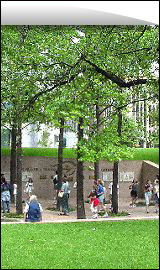 s dedicated in the name of presidents past, present and future." The dove that serves as the centerpiece of the exhibit was personally designed by George Washington and patterned after Noah's Dove of Thanksgiving. Washington used the dove design in the weathervane placed on the roof of his beloved home, Mount Vernon.
s dedicated in the name of presidents past, present and future." The dove that serves as the centerpiece of the exhibit was personally designed by George Washington and patterned after Noah's Dove of Thanksgiving. Washington used the dove design in the weathervane placed on the roof of his beloved home, Mount Vernon.
感恩节的由来要一直追溯到美国历史的发端。1620年,著名的“五月花”号船满载不堪忍受英国国内宗教迫害的清教徒102人到达美洲。1620年和1621年之交的冬天,他们遇到了难以想象的困难,处在饥寒交迫之中,冬天过去时,活下来的移民只有50来人。这时,心地善良的印第安人给移民送来了生活必需品,还特地派人教他们怎样狩猎、捕鱼和种植玉米、南瓜。在印第安人的帮助下,移民们终于获得了丰收,在欢庆丰收的日子,按照宗教传统习俗,移民规定了感谢上帝的日子,并决定为感谢印第安人的真诚帮助,邀请他们一同庆祝节日。
在第一个感恩节的这一天,印第安人和移民欢聚一堂,他们在黎明时鸣放礼炮,列队走进一间用作教堂的屋子,虔诚地向上帝表达谢意,然后点起篝火举行盛大宴会。第二天和第三天又举行了摔交、赛跑、唱歌、跳舞等活动。第一个感恩节非常成功。其中许多庆祝方式流传了300多年,一直保留到今天。
初时感恩节没有固定日期,由各州临时决定,直到美国独立后,感恩节才成为全国性的节日。 1863年,美国总统林肯正式宣布感恩节为国定假日。届时,家家团聚,举国同庆,其盛大、热烈的情形,不亚于中国人过春节。
Part 2 Thanksgiving Celebrations 庆祝感恩节
In 1621, after a hard and devastating first year in the New World the Pilgri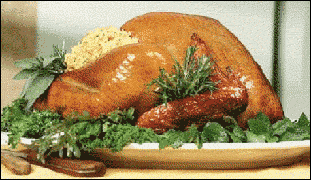 m's fall harvest was very successful and plentiful. There was corn, fruits, vegetables, along with fish which was packed in salt, and meat that was smoke cured over fires. They found they had enough food to put away for the winter. The custom of an annually31 celebrated thanksgiving, held after the harvest, continued through the years.
m's fall harvest was very successful and plentiful. There was corn, fruits, vegetables, along with fish which was packed in salt, and meat that was smoke cured over fires. They found they had enough food to put away for the winter. The custom of an annually31 celebrated thanksgiving, held after the harvest, continued through the years.
Many Americans think of Thanksgiving as a wonderful time to celebrate getting out of school for a long weekend, and eating a great dinner. Or, maybe they think it is the start of the Christmas holiday season.
Harvest festivals and thanksgiving celebrations were also held by the ancient Greeks, the Romans, tthe Chinese, and the Egyptians.
The Greeks
The ancient Greeks worshipped many gods and goddesses. Their goddess of corn (actually all grains) was Demeter who was honored at the festival of Thesmosphoria held each autumn.
On the first day of the festival married women (possibility connecting childbearing and the raising of crops) would build leafy shelters and furnish them with couches made with plants. On the second day they fasted. On the third day a feast was held and offerings to the goddess Demeter were made - gifts of seed corn, cakes, fruit, and pigs. It was hoped that Demeter's gratitude would grant them a good harvest.
The Romans
The Romans also celebrated a harvest festival called Cerelia, which honored Ceres their goddess of corn ,from which the word cereal comes. The festival was held each year on October 4th and offerings of the first fruits of the harvest and pigs were offered to Ceres. Their celebration included music, parades, games and sports and a thanksgiving feast.
The Chinese
The ancient Chinese celebrated their harvest festival, Chung Ch'ui, with the full moon that fell on the 15th day of the 8th month. This day was considered the birthday of the moon and special "moon cakes", round and yellow like the moon, would be baked. Each cake was stamped with the picture of a rabbit - as it was a rabbit, not a man, which the Chinese saw on the face of the moon.
The families ate a thanksgiving meal and feasted on roasted pig, harvested fruits and the "moon cakes". It was believed that during the 3 day festival flowers would fall from the moon and those who saw them would be rewarded with good fortune.
The Egyptians
The ancient Egyptians celebrated their harvest festival in honor of Min, their god of vegetation and fertility. The festival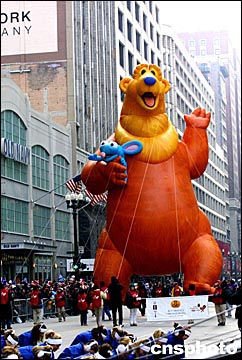 was held in the springtime, the Egyptian's harvest season.
was held in the springtime, the Egyptian's harvest season.
Canada
Thanksgiving in Canada is celebrated on the second Monday in October. Observance of the day began in 1879.
每逢感恩节这一天,美国举国上下热闹非常。城乡市镇到处举行化装游行、戏剧表演和体育比赛等,学校和商店也都按规定放假体息。孩子们还模仿当年印第安人的模样穿上离奇古怪的服装,画上脸谱或戴上面具到街上唱歌、吹喇叭。当天教堂里的人也格外多,按习俗人们在这里都要做感恩祈祷。美国人从小就习惯独立生活,各奔东西。而在感恩节。他们总是力争从天南海北归来,一家人团团围坐在一起,大嚼美味火鸡,畅谈往事,这怎不使人感到分外亲切、温暖。
感恩节宴会后,人们有时会做些传统游戏,比如南瓜赛跑是比赛者用一把小勺推着南瓜跑,规则是不能用手碰南瓜,先到终点者获胜。比赛用的勺子越小,游戏就越有意思。
多少年来,庆祝感恩节的习俗代代相传,无论在岩石嶙峋的西海岸还是在风光旖旎的夏威夷,人们几乎在以同样的方式欢度感恩节,感恩节是不论何种信仰、何种民族的美国人都庆祝的传统节日。
加拿大感恩节与美国不同日,加拿大感恩节是在十月八日。我们在这里介绍了古代希腊、罗马、中国是怎样庆祝感恩节的,大家可以参考上面的英文部分。
Part 3 A Thanksgiving Party 感恩节聚会
Dialogue Script 1 对话原文 1
Sam: Wow, looks like we made it just in time. It's packed in there. 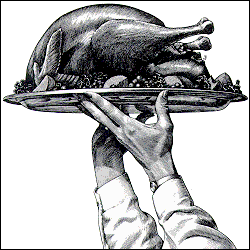
Jenny: Yeah, people always buy out the stores before the big holidays.
Sam: Here're the turkeys. How big of a bird did you want to get?
Jenny: Well, we've got about ten people coming to dinner. So the bigger, the better.
Sam: All right, this one;s the biggest. Are we ready to check out?
Jenny: Not so fast, big guy. We haven't even started! I need everything on the list.
Sam: Uh, can I wait in the car?
(Hours later)
Sam: Jenny, this is the fifth store we've been to!
Jenny: I know, but I have to get just the right ingredients. Otherwise, things will taste wrong.
Sam: Do you always make such a big deal out of Thanksgiving?
Jenny: No, in fact, this will be my first turkey dinner. But the idea behind the holiday is a good one.
Sam: You mean about the Indians and the Pilgrims helping32 one another?
Jenny: Hah! No, not really. But the whole idea of giving thanks, for the things you have, the people who have helped you...
讲解:
1. 对话中,Jenny 和Sam在为感恩节大餐购物。他们来到了商店之后呢,发现人非常的多。 Sam说looks like we made it just in time. It's packed in there. 这里,make it,表示“赶上”,那么we made it just in time,就是“我们来得正是时候”。make it,还可以表示“做成某事,成功”,例如:Come on, you can make it! 来吧,你一定能成功。
2. packed,这里表示“拥挤的”。动词pack是收拾行李的意思,也就是把东西都挤在箱子里,那packed 表示“拥挤的”就很形象。每逢有重大的节日,人们都会买很多过节用的东西,包括食品,服装等等,很多商店都被抢购一空。Jenny说people always buy out the stores before the big holidays. 这里buy out就是把商店的东西买光,抢购一空的意思。big holidays,就是像Thanksgiving, Christmas这样全国性的重大节日。
3. Sam和Jenny想买一只火鸡,也就是turkey,想要多大的火鸡呢?How big of a bird did you want to get? bird,这里指“家禽”,尤指鸡或火鸡,用作食物,例如:Put the bird in the oven. 把鸡放到烤箱里。bird作为俚语还指“人”,尤指奇怪或非凡的人物,比如说,He is a sly old bird. 他是个老滑头。关于bird还有一个成语,就是Kill 2 birds with one stone,一举两得,一箭双雕。
4. Jenny说因为差不多有10个人来吃饭,所以火鸡越大越好,So the bigger, the better. 两个形容词的比较级形式放在一起来用,表示“越…,就越…”,但是不要忘了在比较级形式前加上定冠词the,例如:The more, the better. 越多越好,多多益善。The more you speak, the more mistakes you'll make. 说的越多,错的越多。
5. Sam挑了一只最大的火鸡,问Jenny现在可不可以去结账了。在商店里结账,用check out。Jenny说还差得远呢,东西还没有买全。big guy,这里是指Sam。Sam耐烦了,说Can I wait in the car?我能在车里等吗?看来Jenny也是一个购物狂啊。
6. 是呀,转眼几个小时过去了,他们已经来到了第五家商店,this is the fifth store we've been to! 看来Sam已经累的不行了。但是Jenny坚持说,I have to get just the right ingredients. Otherwise, things will taste wrong. 我一定要买到正确的材料,要不然,做出来的东西味道就不对了。
7. ingredient,(烹调的)配料。taste这个词可以当系动词用,表示“尝起来…味道….”,例如:It tastes good/ bad. 味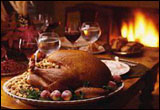 道很好/不好。还可以跟like连用,表示“尝起来有…的味道”,It tastes like soap.吃起来味道跟肥皂一样。smell这个词也可以这样用,例如:It smells good/bad.好闻。/不好闻。
道很好/不好。还可以跟like连用,表示“尝起来有…的味道”,It tastes like soap.吃起来味道跟肥皂一样。smell这个词也可以这样用,例如:It smells good/bad.好闻。/不好闻。
8. Sam问Do you always make such a big deal out of Thanksgiving? 你总是为感恩节这样大费周张吗?make a big deal out of something,小题大作。big deal在口语中表示“重要的事情”。比如说:It's no big deal. 这没有什么大不了的。
9. Jenny说实际上这是她做的第一顿感恩节大餐,这里的turkey dinner就是指“感恩节大餐”,因为turkey是感恩节菜谱中的主菜。But the idea behind the holiday is a good one. 但是节日背后的概念不错。那这个idea是指什么呢?
10. Jenny解释说the whole idea of giving thanks, for the things you have, the people who have helped you...这个概念就是为你所拥有的东西表示感谢,向那些帮助过你的人表达谢意。
Dialogue Script 2 对话原文 2
Sam: Out of bed, sleepyhead. We need to go get a good spot. 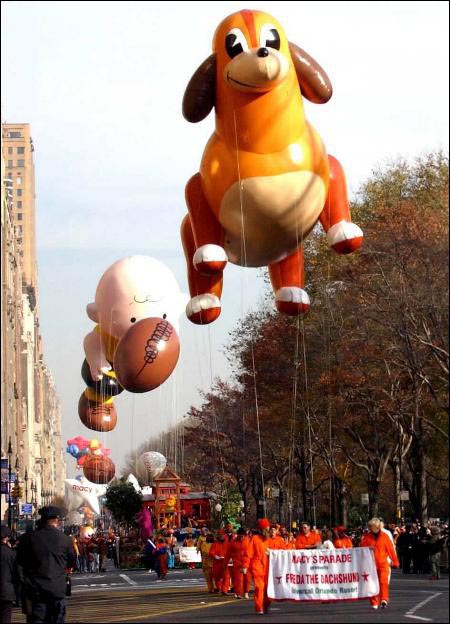
Ann: Wha-what? The sun's not even up yet!
Sam: We're going to the Macy's Thanksgiving Parade! To see all the floats and balloons.
Ann: Can't we just watch it on TV?
Sam: Nope. I promised Jenny we'd go so she can finish cooking.
Ann: OK, I'm coming already! God, this is like getting up for Confucius' Birthday Ceremony!
(During the parade)
Ann: What a prime spot! I've never seen balloons this big!
Sam: This parade is about eighty years old. It's a New York tradition.
Ann: Is that Santa Claus on that float? Isn't Christmas still a month away?
Sam: Hah, yeah, that's true. But, Macy's is a department store, so they want to get you thinking of Christmas early.
Ann: So you'll shop? That's crazy!
Sam: Yeah, and remember Jenny's dad? He's probably already got his Christmas lights up!
Ann: Speaking of Jenny, shouldn't we head back to help?
讲解:
1. 对话中Sam要带Ann去看梅西百货感恩节游行,也就是the Macy's Thanksgiving Parade。梅西百货是美国最大的百货公司,它在感恩节当天举行的大游行,已经成了美国人过感恩节的传统节目之一,有数以万计的人会一大清早,甚至带着睡袋彻夜在路旁等候,就是为了抢一个好位子。get a good spot,就是“占一个好位子”。
2. 嗯,这也就是为什么Ann觉得像参加祭孔大典了,this is like getting up for Confucius' Birthday Ceremony! Confucius就是孔子。如果感恩节当天没去现场看梅西百货游行的人,也会习惯一早打开电视,看电视的现场直播。
3. 1927年,当时纽约梅西百货公司的员工发起了在感恩节当天以化妆游行的方式来庆祝,多年下来就成了传统,甚至后来还加入了超大型的气球玩偶,成了梅西百货感恩节游行的一大特色。时至今日,每到感恩节的早上,从纽约中央公园西侧的77街到梅西百货所在的34街沿路都挤满了来自各地的游客,观看各式各样有几层楼高的大型气球人偶游行。float,这里是指“游行的花车”。
4. Ann还没有睡醒,想在家收看电视直播,Sam不同意,他说Nope. I promised Jenny we'd go so she can finish cooking. 不行,我答应过Jenny我们会去,好让她做完感恩节大餐。Nope.用在口语中,跟no是一样的,表示“不,否定的答复”。那么yep就跟yes一样,用在口语中,表示“是,肯定的答复”。finish doing something,做完某事。
6. Ann没有办法,只好说I'm coming already! 就是“我来了”。如果有人催你快点来,你也正在动身了,这个已经从起点出发而尚未到达终点的过程,我们就可以说I'm coming already!同时,这句话还带点不耐烦的感觉。例如: ---What's taking you so long? --- I'm coming already! ---你在干什么?还不来? ---来了来了!
7. 当然,如果你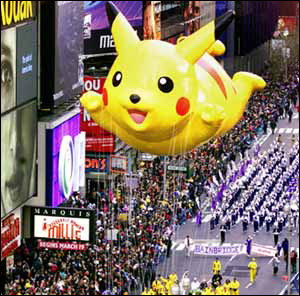 正准备动身离开,也可以说成I'm leaving already. 例如:--- I need you to go home right now!--- OK, OK, I'm leaving already. ---你现在就回家。---好了好了,我这就走。现在Sam和Ann来到了游行的现场,Ann很兴奋,她说What a prime spot! I've never seen balloons this big! 真是个好位置!我从来没见过这么大的气球!prime表示“极好的;第一流的”。
正准备动身离开,也可以说成I'm leaving already. 例如:--- I need you to go home right now!--- OK, OK, I'm leaving already. ---你现在就回家。---好了好了,我这就走。现在Sam和Ann来到了游行的现场,Ann很兴奋,她说What a prime spot! I've never seen balloons this big! 真是个好位置!我从来没见过这么大的气球!prime表示“极好的;第一流的”。
8. Ann突然发现了在一架花车上有圣诞老人的人偶,很奇怪,因为离圣诞节还有一个月呢。Isn't Christmas still a month away? 这虽然是一个问句,但是并不要求别人来回答,有强调的意味,比如说,Isn't it beautiful? 很漂亮,是不是?其实也就是“太漂亮了”的意思。
9. Sam解释说,虽然离圣诞节还有一个月,但是梅西百货已经开始做广告了,让人们早点想到圣诞节。get someone/something doing 让某人某物开始做某事,例如:Get your imagination going! 开动你的想象力!
10. 这样人们就会很快开始为圣诞节购物了,这也是商家一种很有效的宣传方式。这让Sam想起了Jenny的爸爸,也许他已经在挂他的圣诞节彩灯了。说到Jenny,Ann想起也许他们应该赶回去帮Jenny准备感恩节大餐了。speaking of,说到,谈起。head back,回去,相当于go back。
Dialogue Script 3 对话原文 3
Jenny: The turkey's stuffed and has been cooking for about three hours.
Sam: OK, and that's asparagus and that's cranberry33 sauce, but what's that? 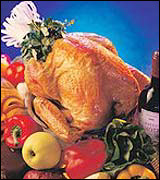
Jenny: Candied yams. With lots of butter and brown sugar and marshmallows on top.
Sam: Wow, you made a ham, too? Why is it covered with pineapple slices?
Jenny: That's decoration. It's a honey ham with a sweet glaze35. Those whole cloves37 are keeping the pineapples on the ham.
Sam: It all looks delicious, Jenny. What can I do to help?
Jenny: Finish the deviled eggs. Then baste38 the turkey!
(An hour later, as people begin to arrive)
Jenny: Help yourselves to the spinach39 dip and other appetizers40. We can eat in about thirty minutes.
Sam: Can we put the rolls on now?
Jenny: Sure can. And it's time to get dad to come carve the turkey for us.
Sam: I'll finish whipping the mashed41 potatoes!
Jenny: We can set the table, too. I just wish we had good china to serve on.
Sam: Don't worry. No one came here for the fancy dishes!
讲解:
1. Jenny在厨房里忙的热火朝天,Sam进来帮她的忙。火鸡已经填好了作料,而且已经烤了3个小时了。stuff做动词表示“填充,装满”,例如:His head is stuffed with silly notions. 他满脑子的愚蠢想法。那么在烤火鸡时塞在火鸡肚子里的面包、蔬菜等“填料”就叫stuffing。
2. cranberry sauce是感恩节餐桌上必不可少的食物,美国每年9、10月份盛产小红梅,所以小红梅酱也成了感恩节大餐中的一个配角,但它可不是当果酱来吃,而是用来蘸食火鸡或其他肉类的。还有一种酱汁是gravy42,虽然美国人不爱吃动物内脏,但是处理火鸡的时候,会把火鸡的内脏切碎,混入烤火鸡时滴下的鸡汁和油,在加上奶油、胡椒、芹菜等作料做成肉汁。gravy可以在烤火鸡时涂在上面,也放在餐桌上,蘸火鸡肉来吃。
3. 还有candied yams,蜜番薯,上面盖满了奶油、红糖和软糖。pumpkin pie,南瓜派,也是感恩节大餐的必备甜品。Jenny还做了蜜汁火腿,honey ham with a sweet glaze,并且加上了糖汁,用菠萝片把火腿包起来做装饰。
4. clove36,丁香,一头圆,一头尖,做蜜汁火腿时,会用尖的那头插进还没有切开的火腿肉内,而圆的那头露在外面,可以支撑贴在火腿上的一片片菠萝。看起来真的是很美味呀。Sam问有什么能帮忙的,Jenny说先把芥末蛋弄完,芥末蛋就是deviled eggs。然后再把火鸡涂上肉汁,baste the turkey,baste,就是在烤肉或烤鱼时为防止烤干而在上面涂抹由油脂、料汁等制成的肉汁。
5. 一个小时之后,客人们来到了Jenny家,Jenny招呼大家说Help yourselves to the spinach dip and other appetizers. 大家不要客气,自己来拿菠菜蘸酱和其他开胃菜。help oneself to something,随便吃某种食物。spinach dip,菠菜蘸酱。appetizer,是开胃菜,通常饭前食用来刺激食欲的食物或饮料。
6. 三十分钟内就能开饭了。Can we put the rolls on now? 就是“我们现在可以上面包卷了吗?”。Jenny说也该叫爸爸来为大家切火鸡了。传统上,在烤好的火鸡上动第一刀的人,都是一家之主,尤其是男主人。
7. 这里还要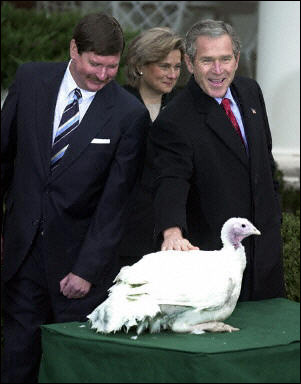 给大家介绍一个吃火鸡的传统,就是在切开火鸡之后,鸡胸的部分会有一个叉骨,两个人可以先许愿,然后分别拿着叉骨的一端一起折断,传说中谁手上剩的骨头比较大,谁的愿望就可以实现,所以这块骨头叫做“许愿骨”,也就是wishbone,那折许愿骨的赢家,就是wishbone pull winner。
给大家介绍一个吃火鸡的传统,就是在切开火鸡之后,鸡胸的部分会有一个叉骨,两个人可以先许愿,然后分别拿着叉骨的一端一起折断,传说中谁手上剩的骨头比较大,谁的愿望就可以实现,所以这块骨头叫做“许愿骨”,也就是wishbone,那折许愿骨的赢家,就是wishbone pull winner。
8. 听起来很有意思。Sam的土豆泥也快搅好了,whip,指“搅打鸡蛋,奶油等”。set the table,把餐具等摆上饭桌。那吃过饭后收拾桌子就是clear the table。
9. Jenny非常希望能有好的瓷器可以端上去,Sam安慰她说No one came here for the fancy dishes! 没有关系,没有人是为了精致的餐具而来的,而是为了美味的感恩节大餐。在这里还要说一下,大部分的美国家庭是在下午吃感恩节大餐,而不是晚上。这样的话午餐、晚餐就都省了,晚上肚子饿的时候,再吃大餐的剩菜,或者用剩下的肉做成火鸡三明治。
10. 看来每年感恩节的时候呢都会有数百万的火鸡被杀,为了纪念这些火鸡的牺牲,白宫每年感恩节都会特赦一只火鸡,让它安养到老,也是一个很有意思的传统。
Part 4 Some Recipes for Thanksgiving Dinner 感恩节菜谱
现在给大家介绍一种小红梅酱的做法。
1-1/2 C sugar
1 navel orange
1/2 t grated ginger44 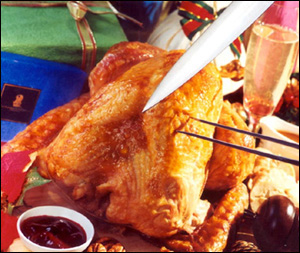
4 C cranberries45
1/2 C (2 oz.) toasted pecans
Grate the orange peel and add to a pot with the sugar and ginger.
Add the juice from the orange into the pot and simmer over medium heat until the sugar is dissolved.
Add cranberries and cook until they pop - about 5 minutes.
Add pecans and cool sauce.
How to Cook A Turkey
This turkey is work... it requires more attention than an average six-month-old baby. There are no shortcuts46, as you will see.
Get a HUGE turkey-- I don't mean just a big, big bird, but one that looks as though it gave the farmer a hard time when he did it in. It ought to weigh between 16 and 30 pounds. Have the poultryman, or butcher, cut its head off at the end of the neck, peel back the skin, and remove the neck close to the body, leaving the tube. You will want this for stuffing. Also , he should leave all the fat on the bird.
When you are ready to cook your bird, rub it inside and out with salt and pepper. Give it a friendly pat and set it aside. Chop the heart, gizzard, and liver and put them, with the neck, into a stewpan with a clove of garlic, a large bay leaf, 1/2 tsp coriander, and some salt. I don't know how much salt-- whatever you think. Cover this with about 5 cups of water and put on the stove to simmer. This will be the basting48 fluid a little later.
About this time I generally have my first drink of the day, usually a RAMOS FIZZ. I concoct49 it by taking the whites of four eggs, an equal amount of whipping cream, juice of half a lemon (less 1 tsp.), 1/2 tsp. confectioner's sugar, an appropriate amount of gin, and blending with a few ice cubes. Pour about two tablespoons of club soda50 in a chimney glass, add the mix, with ice cubes if you prefer. Save your egg yolks, plus 1 tsp. of lemon -- you'll need them later. Have a good sip51! (add 1 dash of Orange Flower Water to the drink, not the egg yolks)
Get a huge bowl. Throw into it one diced52 apple, one diced orange, a large can of crushed pineapple, the grated rind of a lemon, and three tablespoons of chopped preserved ginger (If you like ginger, double this -REB). Add 2 cans of drained Chinese water chestnuts53. Mix this altogether, and have another sip of your drink. Get a second, somewhat smaller, bowl. Into this, measuring by teaspoons54, put:
2 tsp hot dry mustard
2 tsp caraway seed
2 tsp celery seed
2 tsp poppy seed
1 tsp black pepper
2 1/2 tsp oregano
1/2 tsp mace55
1/2 tsp turmeric
1/2 tsp marjoram
1/2 tsp savory56
3/4 tsp sage57
3/4 tsp thyme
1/4 tsp basil
1/2 tsp chili58 powder
In the same bowl, add:
1 Tbsp poultry47 seasoning59
4 Tbsp parsley
1 Tbsp salt
4 headless crushed cloves
1 well-crushed bay leaf
4 lrg chopped onions
6 good dashes Tabasco
5 crushed garlic cloves
6 lrg chopped celery
Wipe your brow, refocus your eyes, get yet another drink--and a third bowl. Put in three packages of unseasoned bread crumbs60 (or two loaves of toast or bread crumbs), 3/4 lb. ground veal61, 1/2 lb. ground fresh pork, 1/4 lb. butter, and all the fat you have been able to pull out of the bird.
About now it seems advisable to switch drinks. Martinis or stingers are recommended (Do this at your own risk - we always did! -REB). Get a fourth bowl, an enormous one. Take a sip for a few minutes, wash your hands, and mix the contents of all the other bowls. Mix it well. Stuff the bird and skewer62 it. Put the leftover63 stuffing into the neck tube.
Turn your oven to 500 degrees F and get out a fifth small bowl. Make a paste consisting of those four egg yolks and lemon juice left from the Ramos Fizz. Add 1 tsp hot dry mustard, a crushed clove of garlic, 1 Tbl onion juice, and enough flour to make a stiff paste. When the oven is red hot, put the bird in, breast down on the rack. Sip on your drink until the bird has begin to brown all over, then take it out and paint the bird all over with paste. Put it back in and turn the oven down to 350 degrees F. Let the paste set, then pull the bird out and paint again. Keep doing this until the paste is used up.
Add a quart of cide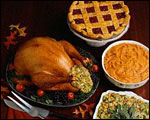 r or white wine to the stuff that's been simmering on the stove, This is your basting fluid. The turkey must be basted64 every 15 minutes. Don't argue. Set your timer and keep it up. (When confronted with the choice "do I baste from the juice under the bird or do I baste with the juice from the pot on the stove?" make certain that the juice under the bird neither dries out and burns, nor becomes so thin that gravy is weak. When you run out of baste, use cheap red wine. This critter makes incredible gravy! -REB)The bird should cook about 12 minutes per pound, basting every 15 minutes.
r or white wine to the stuff that's been simmering on the stove, This is your basting fluid. The turkey must be basted64 every 15 minutes. Don't argue. Set your timer and keep it up. (When confronted with the choice "do I baste from the juice under the bird or do I baste with the juice from the pot on the stove?" make certain that the juice under the bird neither dries out and burns, nor becomes so thin that gravy is weak. When you run out of baste, use cheap red wine. This critter makes incredible gravy! -REB)The bird should cook about 12 minutes per pound, basting every 15 minutes.
As the bird cooks, it will first get a light brown, then a dark brown, then darker and darker. After about 2 hours you will think I'm crazy. The bird will be turning black. (Newcomers to black turkey will think you are demented and drunk on your butt34, which, if you've followed instructions, you are -REB) In fact, by the time it is finished, it will look as though we have ruined it. Take a fork and poke65 at the black cindery66 crust.
Beneath, the bird will be a gorgeous mahogany, reminding one of those golden-browns found in precious Rembrandts. Stick the fork too deep, and the juice will gush67 to the ceiling. When you take it out, ready to carve it, you will find that you do not need a knife. A load sound will cause the bird to fall apart like the walls of that famed biblical city. The moist flesh will drive you crazy, and the stuffing--well, there is nothing like it on this earth. You will make the gravy just like it as always done, adding the giblets and what is left of the basting fluid.
Part 5 Questions for You to Answer 我问你答 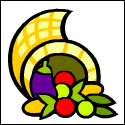
在节目的最后我们为大家准备了一些跟Thanksgiving有关的选择题,有兴趣的朋友可以做一下,我们会在下期节目当中公布正确答案。
1. What year did the Pilgrims have their first Thanksgiving Feast?
a.1619 b. 1620 c. 1621 d. 1935
2. What food was probably NOT on the Pilgrims' Thanksgiving menu?
a. Potatoes b. Corn c. Fish d. Dried Fruit
3. In 1676, a day of thanksgiving was proclaimed to take place during what month?
a. May b. June c. October d. November
4. Which president first established the date of Thanksgiving as a national celebration?
a. Jefferson b. Adams c. Lincoln d. Wilson
5. Canada celebrates Thanksgiving on...
a. 2nd Monday in October b. 2nd Thursday in November c. 3rd Thursday in November d. May 1
 收听单词发音
收听单词发音 




